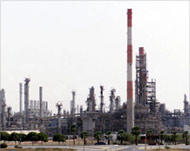Energy chief warns of petrol shortfall
An extra three million barrels per day of production capacity worldwide is needed to avoid another year of blistering oil prices, the International Energy Agency chief warns.

“We expect oil demand will be around two million barrels per day more in 2005 versus the average in 2004 so we need something like three million barrels per day of additional capacity globally,” IEA executive director Claude Mandil said on Sunday.
He was speaking on the eve of the 19th World Energy Congress in Sydney. Mandil said improved political stability in the Middle East would also be needed to temper prices.
US oil, propelled by surging world demand for petroleum and violence in Iraq, traded at $44 a barrel on Friday, within $5.50 of record highs reached in August.
Asked whether he expected the Organisation of Petroleum Exporting Countries (OPEC) to raise official production quotas at its next meeting on 15 September, Mandil said: “I don’t think OPEC can do a lot immediately because they produce more than what is needed.
“The best thing for the OPEC meeting would be a pledge for immediate investment in additional capacity”.
Saudi output
Mandil said he believed higher output from Saudi Arabia – the world’s top exporter – should be enough to bring US oil prices below $40 but declined to elaborate.
 |
|
Riyadh is the only OPEC producer |
“So far we haven’t yet seen the impact of high prices on economic growth but if they stay at this level we will certainly see it.”
The IEA, the West’s energy watchdog, has calculated that a $10 increase in oil prices would cause global GDP growth to contract 0.4%.
A Reuters survey this month showed total August output from OPEC rose 100,000 bpd to 29.6 million bpd. Saudi Arabia raised supply to 9.5 million bpd, up 250,000 bpd.
OPEC production is near its highest since December 1979, just below the 29.76 million it pumped in November 2000.
But Mandil said surging oil prices were not changing the attitudes of oil companies on investment in new capacity, who he said continued to take a conservative $20 view of prices.
Chinese demand
He said it was difficult to judge whether an expected slowdown in oil demand growth from China was starting to occur but said the world’s second biggest oil consumer could do more to improve energy efficiency.
China, the world’s seventh largest economy, has shaken up the oil market this year, intensifying competition for supply with established consuming giants such as the United States.
“What we know is that the Chinese government is aware it has to slow down the economy and slowing the economy means slowing down oil consumption.”